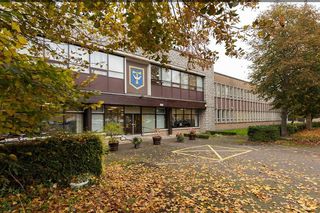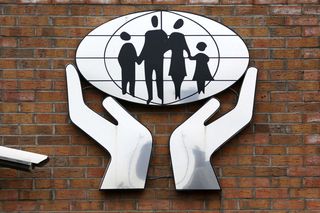Emily Hourican comes to the end of her cancer treatment - 'Day by day, hour by hour - Just put one foot in front of the other...'
Emily Hourican. Photo: David Conachy
And so here I am, in the final analysis, face-to-face with myself. All the layers have been stripped away by the misery of this process: the surface charm of looks, sense of humour, energy, resilience. It's all gone. There is nothing left except whatever the most basic me is. And for a while, that looks bad. Like Dorothy in Oz, it seems that all those things that are gone were just large-scale projections, and that the person behind them is nothing more than a small wizard, capable of creating the illusion of greatness and terribleness, but not actually either of those things.
The stripping-back process has been like walking through a house with many rooms. The first are the public rooms, as grand and impressive as you can make them. Then the family rooms, shabbier, but comfortable and cosy. Then the personal rooms, places to be alone and to work; plain, unadorned, but solid. Finally, the last room of all, the innermost sanctuary; somewhere tiny and bare. And the person in that last room, my most essential self, turns out at first to be smaller, more feeble and fearful, than I expected. Not enough to begin the journey back to health, to happiness, to vitality, with. And yet over the few days in hospital, that person comes through, turns out to be bowed but not broken. It's more a dogged kind of 'get on with it', than anything more glorious, but it's enough. It will do.
I don't know how the romantic poets, or the Beat Generation, did it. Wrote beautifully when stoned out of their minds. After the small amount of morphine I've had in the last few days - yes, I have climbed the 'ladder' of pain relief and am now balancing on the top rung - I'm finding it difficult to marshal any coherent thoughts. So forgive if this is rather more rambling than usual.
This is my last column. My last full week of treatment. My swan song. Except that swans, apparently, sing before they die. I, on the other hand, am writing this before I go off and live. Live fully, live joyfully. Live in all the ways I haven't been able to over the last few months.
My cancer 'journey' is all but over. There are scans and assessments and, presumably, clean bills of health to be issued over the next months, of course, but the hard part is done. And for the rest, for the good outcome, I trust entirely, to my doctors and the universe.
As has been the way throughout this 'journey', a lot happened in a week. Last Friday I came into hospital, had my 20-minute radio session, and went home as usual, for a weekend largely spent in bed. By Monday when I came back in, my team decided to admit me as an in-patient for a few days. Dehydration, excessive weight loss and general miserableness were the reasons. So I moved into a quiet room in St Luke's for three nights of IV drips and general minding. And it was nice - being gently bossed, told what to do and take and when - but it wasn't the answer to my prayers.
I suppose I thought, somewhere, that being taken in to hospital would mean being 'fixed', and made to feel better. And of course that can't really happen. Only the end of treatment and the passage of time is going to fix me fully. This, initially, is a source of bitter disappointment.
At one point I feel so bad that the temptation is simply to give up, turn my face to the wall. Refuse to engage any more with the misery of eating, of trying, of talking to my team about how I am and how I might be made to feel marginally better. My body is slyly suggesting it: 'give up. Let it go. Just lie down in bed and refuse to see or speak to anyone. Refuse the trays, the well-meaning attempts to cheer, the offers of help.' But I don't. Partly for the sake of my team, who really are trying, but mainly because I don't admire quitting. I'm not easy with it. Not since I dropped out of the school play when I was 14, because I didn't get the part I wanted and rehearsals weren't much fun after all. "Fine," said my mother when I told her that I'd given it up "but I hope you're not going to be one of those people who lets other people down and gives up when things are hard."
The way she said it, I hoped I wasn't either. I could see that those weren't good things to be. Since then, I have tried to stick at what I've promised to do, even when it gets difficult. That is a habit of mind, but it's a good one. It stands to me now.
"Day by day," I tell myself. "Hour by hour. One foot in front of the other..." And it works, the way that kind of auto-advice always does. It gets you through the next few minutes, the next couple of hours, and then, often, events simply overtake you.
On Wednesday, the decision was made to insert a feeding tube running from my nose to my stomach, in order to get a decent amount of calories into me, bypassing my mouth. I was very enthusiastic - living on subsistence calories is awful (those who choose to do it, and there are people who do, are in my opinion, completely mad), and the horrors of trying to eat with no appetite, with nausea, with the very real possibility of vomiting it all up again, just gets too much after a few weeks. The great anti-sickness pill of last week worked for a few days, and then stopped working. So, bring on the tube, I said.
But of course there are no easy solutions to this thing. Inserting the tube is very unpleasant. Painful and awkward, and the oddness continues once it's in place. I look like Dumbo the elephant, with a big pink sticking plaster on my nose and a tube sticking out the end of it. But the tube comes into its own when I get several hundred millilitres of high-calorie liquid food poured into it, straight to my stomach, and it stays down. It feels strange as it progresses down the tube, and not particularly nice, but I go to sleep not hungry for the first time in weeks, and sleep brilliantly.
For the rest of the symptom round-up - my throat and mouth are now sore enough to justify the morphine (which is far less of a buzz than I would have expected. Actually, it feels like nothing, except the pain goes, and then I get a faint headache), and my neck is a mess. It reminds me of a particularly vicious line of Jonathan Swift's from A Tale of A Tub: "Last week I saw a woman flayed, and you will hardly believe how much it altered her person for the worse." That's pretty much what my neck looks like, and so I simply don't look at it, ever, if I can help it. I leave it bandaged up and let the nurses deal with it. They tell me it will heal and return to normal once the radiotherapy stops. They also tell me they have seen far worse. I have to believe them.
For all that I refuse to think of cancer as 'a wake-up call' or catalyst to change my life - I like my life very much, always have; my life has never been the problem, just, recently, my body - I think I need to remember these moments of all-time lowness. Etch them into my memory. Because having lived through them, every single other thing should be a joy in comparison. With this as the base line, there can be no more bad days.
And so, I'm done. Wish me luck as I now try to get over the cure. To forget the many indignities done to me; the needles, syringes, swabs, drips and drugs; the horrible whining hum of the radiotherapy machine, like an evil mosquito. In a very strange way, despite the utter misery of these last few months, I'm not sorry this happened to me.
There are so many people who live with the fear and pain that I have known over the last while, either on their own behalf or on behalf of their loved ones; who inhabit this strange and sad world of cancer, and in an odd way it has been a privilege to share in some of that. To understand more fully what it means to be diagnosed with this terrible disease. I wouldn't have chosen it, and I hope never to go through it again, but, having been forced to see and live it close-up, and meet so many other people similarly forced, I can't entirely wish it away.
Maybe that is simply what the psychologists call 'positive bias,' but I think it's a bit more than that. Cancer is hell, but it is a reality for so many people; I can't be sorry to understand a little bit more about their lives. That may be the morphine talking, but I don't think so.
Join the Irish Independent WhatsApp channel
Stay up to date with all the latest news














